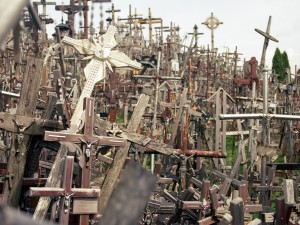God has wrath. This is not the same thing as the human emotion of anger because men frequently get angry and then do great harm by their anger.
It’s a tricky business preaching or teaching about God and wrath because if you’re not careful you can misrepresent God or leave his people (and by that I mean all persons) with the wrong impression.
I am grateful for a God who hates murder and greed and abuse and lust and every form of self-centered existence—who rejects all false worship—that leads to so much destruction, more abuse, lack, fear, mental anguish, bodily harm, and death in this good world that he made.
In the prophets, God’s wrath seems kindled as often by our treatment of the poor as it is by the worship of false gods (money, sex, human strength and ingenuity and…take your pick).
God’s wrath is like our desperate human longing and impatience for a place where all deprivations and falsehoods are absent, for the peaceable world he intended in the beginning.
Wrath is also a lot like revulsion.
When humans witness atrocity—if we are not warped already by too much of it—we get nauseous and throw up; something at the center of our souls makes us sick when we witness or experience tangible evil.
The Scriptures speak often of God’s sorrow at our evil; it moves him to the point of sadness.
He is jealous for relationship with us but cannot abide our lawlessness, our manipulations of each other, our willful disregard for the good.
All of these things—revulsion, sorrow, anger—are indicators within us that partially describe the character of God but in God there is no admixture of imperfection. His anger and sorrow and revulsion and jealousy are pure.
This is why—among countless reasons—it was necessary for the Word to become flesh. It’s too easy to make an image of God in our likeness by mere words on a page. The demons do this with the pages of Scripture. It’s too easy for humans to imagine a God like Set, Kali, Zeus or Mars.
Jesus—God in the flesh—teaches and models a radical love of brother and enemy. In his command that we love our enemies, the Living God shines a penetrating light on what is different about our God from all other gods and from us.
Jesus is angry, contemptuous, and impatient of our greed, indifference, and spiritual pride. Yet while we see flashes of these traits—exercised in holiness—they are eclipsed by his compassion, solidarity, sorrow, patience, and, yes, always love.
This is why his apostles constantly refer to the love of God. God has wrath but John says it best: God is love. It’s not a feeling of love that God has, it’s not merely that he is predisposed to love; no, his very essence is love. All of the activity of God is best described as love.
He commands us to love as he has loved us. This would seem impossible except that he commands us to do it—to love—and with the command blesses us, invokes over us, the capacity to love as he loves.
God always grants us the ability to do anytime he requires of us. We must yield to his love working through us. It is not our love that can love well, love selflessly, but his love.
When he tells us to love our enemies he is inviting us to participate in one of the deepest attributes of divinity: indiscriminate concern, regard, favor, mercy, and service for and toward all, not caring for oneself over another.
Loving involves pain. If you love your enemy you will be rejected by those who hate your enemy and (very often) the enemy you seek to love. You will be rejected and despised by all who have not already been conquered by love and the command to love.
Love is active. Love looks like incarnation: born in poverty without fanfare. Love looks like the disposition of Christ at this baptism: it does everything it can to promote right relationship with God and others.
Love looks like compassion for the prisoner, the hungry, the dying, the naked, the possessed, the friendless, the leper, the foreign born, the blind, the unwanted, the weak and helpless, the oppressed. Love even looks with compassion on its enemies.
Love looks like washing feet, dining with sinners, rescuing prostitutes, and healing on the sabbath. Love looks like late night conversations, conversations at watering holes, roadside conversations. Love walks the extra mile.
Love weeps in graveyards. Love hates death.
Love looks like silence before accusation, like a lash-torn back, like a crown of thorns, like nails through hands and feet. Love looks like thirst and anguish and unimaginable pain and the feeling that God has left you.
Love looks like the weight of collective human sin carried and borne down all the way, down to the depths of hell and swallowed up.
Love looks like the truly greatest of all become the servant of all, even of the most unworthy and unloving.
In other words love looks like suffering. Love looks like mercy triumphing over judgment because you are willing to take all judgment on yourself.
If after seeing God in Jesus Christ one imagines that he hates anything that he has made or desires the death of anyone—that he both loves us and hates us (Calvin)—you need to look on Christ again and again and keep looking, and reaching out for a touch from him, until he blesses you as he blessed John:
“We proclaim to you the one who existed from the beginning, whom we have heard and seen. We saw him with our own eyes and touched him with our own hands. He is the Word of life. This one who is life itself was revealed to us, and we have seen him. And now we testify and proclaim to you that he is the one who is eternal life. He was with the Father, and then he was revealed to us. We proclaim to you what we ourselves have actually seen and heard so that you may have fellowship with us. And our fellowship is with the Father and with his Son, Jesus Christ. We are writing these things that you may fully share our joy. This is the message we heard from Jesus and now declare to you: God is light, and there is no darkness in him at all.”
In him there is no darkness at all.
John’s description of Incarnate Love goes on and on like this. Read the whole letter.











